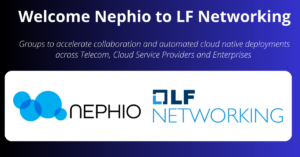
- Nephio has been inducted into the LF Networking as a Graduated project to accelerate collaboration and automated cloud native deployments across Telecom, Cloud Service Providers and Enterprises
- End- to -end open network stack fully realized across Linux Foundation, LF Networking and LF Edge communities, accelerating development and deployment of next-gen network technology with one of the largest global networking community
- Community to host Nephio R2 Technical Summit October 9-10 to gather Nephio developers for discussion across strategy, roadmap and operational aspects of cloud native automation
SAN FRANCISCO – October 4, 2023 – The Linux Foundation, the nonprofit organization focused on fostering innovation through open source, today announced that its Project Nephio, an open source initiative of partners across the telecommunications industry working towards true cloud-native automation, has joined the LF Networking (LFN) project umbrella. Under the auspices of the Linux Foundation’s LF Networking – the facilitator of collaboration and operational excellence across open source networking projects – Nephio joins other leading network ecosystem projects and initiatives including ONAP, 5G Super Blue Print, Anuket, L3AF, OpenDaylight, ODIM, FD.io and more.
“LF Networking is thrilled to welcome Nephio to its project portfolio,” said Arpit Joshipura, general manager, Networking, Edge, and IoT at the Linux Foundation. “Having just issued its first milestone release, Nephio’s role in enabling telecoms to automate entire networks more efficiently is part and parcel to the other project communities hosted under LFN that make up the end-to-end open networking stack.”
Launched in 2022 in partnership with Google Cloud, Nephio delivers carrier-grade, simple, open, Kubernetes-based cloud native intent automation and common automation templates that materially simplify the deployment and management of multi-vendor cloud infrastructure and network functions across large-scale edge deployments. It brings zero-touch provisioning of cloud infrastructure and network functions, which can offer increased network availability and resiliency while reducing maintenance downtime.
Nephio recently issued its first release, Nephio R1, community further expanded the seed code provided by Google Cloud and introduced features to empower telecoms to efficiently configure and manage cloud infrastructure and network functions using Kubernetes-based intent automation.
“Nephio’s induction into LFN will bring a more integrated governance structure to both communities,” said Kandan Kathirvel, Nephio Technical Steering Committee (TSC) chair and Group Product manager, Google Cloud. “With similar goals and a large number of organizations actively participating in both communities, the move will simplify cross-stack integration and streamline infrastructure. The technical community is eager to work more closely with peers and colleagues to accelerate deployments of cloud-native automed networks.”
Nephio’s induction into LFN will bring closer collaboration, an expansion of shared resources, and more simplified and streamlined governance. Nephio joins LFN at the “graduated” lifecycle tier, meaning it has met specified criteria for lifecycle maturity, alongside other graduated LFN projects Anuket, ONAP, OpenDaylight and FD.io.
Nephio R2 Technical Summit
Bringing the global Nephio developer community together to discuss strategy, roadmap, and operational aspects of Cloud Native Automation, Nephio will hold its Nephio R2 Technical Summit October 9-10 in Mountain View, California to plan the next release. The event will take place at the Google campus. Attendance is free, however registration is required. For details and registration, please visit: https://events.linuxfoundation.org/nephio-r2-technical-summit/
About the Linux Foundation
The Linux Foundation is the world’s leading home for collaboration on open source software, hardware, standards, and data. Linux Foundation projects are critical to the world’s infrastructure including Linux, Kubernetes, Node.js, ONAP, PyTorch, RISC-V, SPDX, OpenChain, and more. The Linux Foundation focuses on leveraging best practices and addressing the needs of contributors, users, and solution providers to create sustainable models for open collaboration. For more information, please visit us at linuxfoundation.org. The Linux Foundation has registered trademarks and uses trademarks. For a list of trademarks of The Linux Foundation, please see its trademark usage page: https://www.linuxfoundation.org/trademark-usage. Linux is a registered trademark of Linus Torvalds.